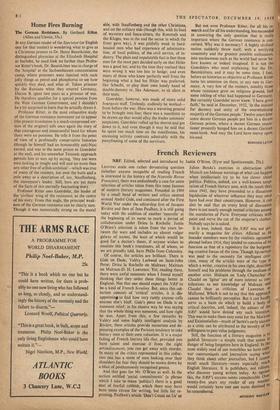Home Fires Burning
The German Resistance. By Gerhard Ritter. (Allen and Unwin, 355.) IF any German reader of the Spectator (or English one for that matter) is wondering what to give as a Christmas present to Dr. Heinz Baumkotter, the distinguished physician at the Elizabeth Hospital at Iserlohn, he need look no farther than Profes- sor Ritter's book. Dr. Baumkotter was in charge of the 'hospital' at the Sachsenhausen concentration camp, where prisoners were injected with such jolly things as petrol and phosphorus to see how quickly they died, and what of. Taken prisoner by the Russians when they entered Germany, Doctor B. spent two years as a prisoner of war. Be therefore qualifies for a special pension from the West German Government, and I shouldn't be a bit surprised to learn that he actually draws it.
Professor Ritter, in the most exhaustive study of the German resistance movement yet to appear (the present translation is a much-compressed ver- sion of the original) tells once again the story of that courageous and unsuccessful band for whom there were no pensions. He tells it from the point of view of a profoundly conservative historian (though he himself had an honourably anti-Nazi record, and was in the same prison as Goerdeler at the end), and his somewhat Teutonic approach permits him to sum up by saying, 'they too were men lacking in insight and will and no more than any other free of selfish ambition'—which was true of many of the resisters, but over the butts and a mile away as a description of, say, Stauffenberg, the movement's leader. Still, here are yet more of the facts of this eternally fascinating story.
Professor Ritter uses Goerdeler, the leader of the 'civilian' wing of the resistance, as the centre of his story. From this angle, the principal weak- ness of the German resistance can be clearly seen. Though it was numerically strong on the moral
side, with Stauffenberg and the other Christians, and on the military side (though this, with its load of waverers and fence-sitters, the Rommels and the Kluges, was in the end the sector in which the front gave way), it was pitifully weak in hard- headed men who had experience of administra- tion, of local politics, of the civil service, of in- dustry. The plain and unpalatable fact is that these men for the most part decided early on that Hitler was a good bet, and by the time they realised they were wrong it was too late to hedge; and even many of those who knew perfectly well from the beginning what a bad bet Hitler was preferred, like Schacht, to play their own lonely hand of double-dummy or, like Adenauer, to sit silent in their tents.
Goerdeler, however, was made of more solid bourgeois stuff. Tirelessly, endlessly he worked— from before the war. Here was a wavering general to be brought into line; there was a manifesto to be drawn up that would allay the trades unionists' suspicions. Goerdeler rolled up his sleeves and got down to it, and even though it may be said that he spent too much time on the manifestoes, his unceasing activity contrasts admirably with the pussyfooting of some of the survivors. But not even Professor Ritter, for all his re- search and for all his understanding, has succeeded in answering the only question that is really important where the German resistance is con- cerned. Why was it necessary? A highly civilised nation suddenly threw itself, with a terrifying unanimity and the greatest possible enthusiasm, into uncleanness such as the world had never be- fore known or indeed imagined. It is not the Goerdelers who need explaining, but the Dr. BaumkOtters, and it may be some time, I fear, before an historian as objective as Professor Ritter turns his attention on them, at any rate in Ger- many. A very few of the resisters, notably those whose resistance grew on religious ground, had some inkling of what had happened to Germany. But certainly Goerdeler never knew. 'I have great faith,' he said in December, 1932, 'in the instinct for decency and unity of the overwhelming majority of the German people.' Twelve years later some decent German people put him in a decent German prison, where a decent German execu- tioner presently hanged him on a decent German meat-hook. And may the Lord have mercy upon his soul.
BERNARD LEVIN

























 Previous page
Previous page